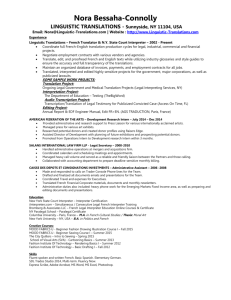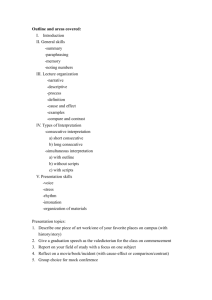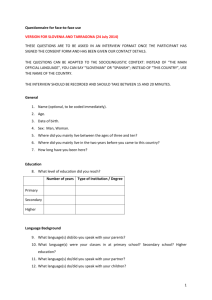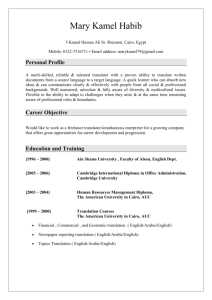Complex Syntax & Compression in Interpreting
advertisement
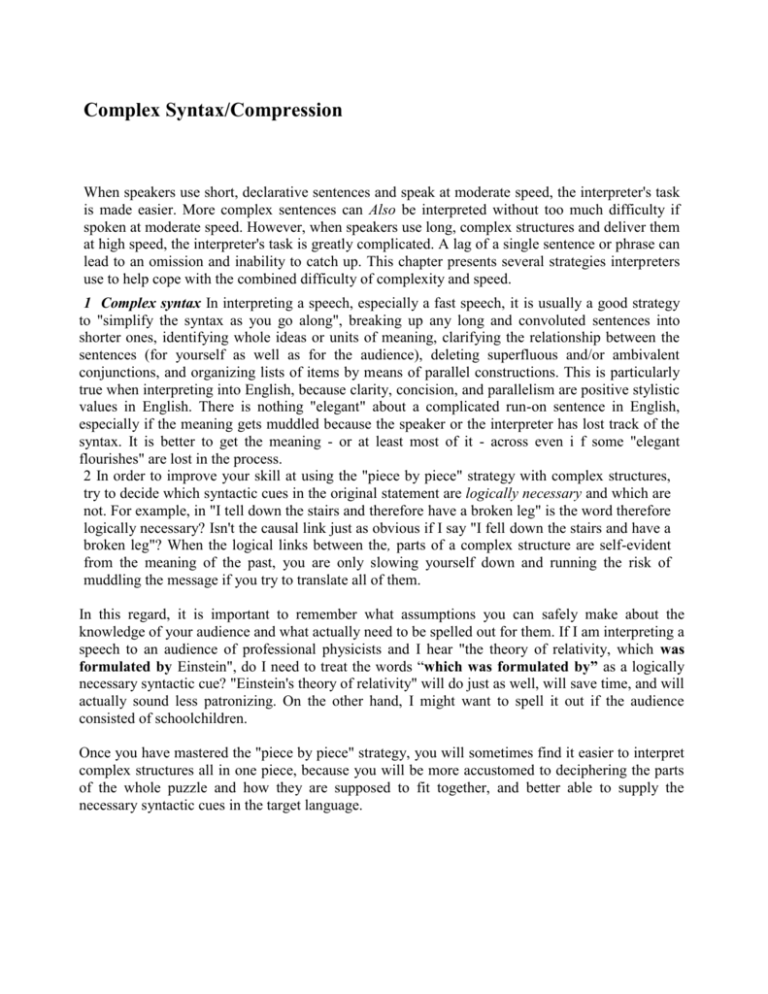
Complex Syntax/Compression When speakers use short, declarative sentences and speak at moderate speed, the interpreter's task is made easier. More complex sentences can Also be interpreted without too much difficulty if spoken at moderate speed. However, when speakers use long, complex structures and deliver them at high speed, the interpreter's task is greatly complicated. A lag of a single sentence or phrase can lead to an omission and inability to catch up. This chapter presents several strategies interpreters use to help cope with the combined difficulty of complexity and speed. 1 Complex syntax In interpreting a speech, especially a fast speech, it is usually a good strategy to "simplify the syntax as you go along", breaking up any long and convoluted sentences into shorter ones, identifying whole ideas or units of meaning, clarifying the relationship between the sentences (for yourself as well as for the audience), deleting superfluous and/or ambivalent conjunctions, and organizing lists of items by means of parallel constructions. This is particularly true when interpreting into English, because clarity, concision, and parallelism are positive stylistic values in English. There is nothing "elegant" about a complicated run-on sentence in English, especially if the meaning gets muddled because the speaker or the interpreter has lost track of the syntax. It is better to get the meaning - or at least most of it - across even i f some "elegant flourishes" are lost in the process. 2 In order to improve your skill at using the "piece by piece" strategy with complex structures, try to decide which syntactic cues in the original statement are logically necessary and which are not. For example, in "I tell down the stairs and therefore have a broken leg" is the word therefore logically necessary? Isn't the causal link just as obvious if I say "I fell down the stairs and have a broken leg"? When the logical links between the, parts of a complex structure are self-evident from the meaning of the past, you are only slowing yourself down and running the risk of muddling the message if you try to translate all of them. In this regard, it is important to remember what assumptions you can safely make about the knowledge of your audience and what actually need to be spelled out for them. If I am interpreting a speech to an audience of professional physicists and I hear "the theory of relativity, which was formulated by Einstein", do I need to treat the words “which was formulated by” as a logically necessary syntactic cue? "Einstein's theory of relativity" will do just as well, will save time, and will actually sound less patronizing. On the other hand, I might want to spell it out if the audience consisted of schoolchildren. Once you have mastered the "piece by piece" strategy, you will sometimes find it easier to interpret complex structures all in one piece, because you will be more accustomed to deciphering the parts of the whole puzzle and how they are supposed to fit together, and better able to supply the necessary syntactic cues in the target language. 7 Ambivalent conjunctions Ambivalent conjunctions placed at the beginning of a sentence can create problems in interpretation. If the interpreter ascribes the wrong meaning to the conjunction, the interpretation of the rest of the sentence will turn out wrong, and there will usually be no way to correct it because there will not be time. For example, the word "since" may mean (a) from the time when, or (b) due to the fact that. How is a Spanish interpreter to know whether to begin his sentence with "Desde que. .." or "Puesto que. .."? Rather than take a 50% chance of being wrong, it is better to delete the initial conjunction and insert the needed concept at a later point in the sentence: Since my government began making contributions to this program 20 years ago, we will not stop supporting it now. = Mi gobierno comenzó a contribuir a este programa hace 20 años; por consiguiente, no cesaremos de hacerlo hoy. Since my government began making contributions to this program 20 years ago, it has scored many successes. = Mi gobierno comenzó a contribuir a este programa hace 20 años; desde entonces el programa ha registrado muchos logros. (a) Translate the following sentences without translating the initial "since", and dividing them into more than one sentence if it seems desirable for ease or clarity: Since the Middle East peace process was set in motion by the Madrid Peace Conference in 1991, the Republic of Korea has consistently held the view that peace cannot be whole without reconciliation between Israel and Syria, and between Israel and Lebanon. Since the Thai Government has long supported the Middle East peace process, the termination of the state of war between Jordan and Israel, announced in Washington in July this year, following last year's historic agreement between Israel and the PLO, gives all of us reason to rejoice. Since the success of this first meeting, the ASEAN Regional Forum has become a viable forum for the promotion of trust as well as political and security cooperation within the AsiaPacific region. (b) In the example given above ("Since my government began making contributions ..."), is the word "since" a logically necessary syntactic cue? Would the meaning be sufficiently clear if the ambivalent conjunction were omitted altogether, or replaced by a simple "and"? Consider the following: My government began making contributions to this program 20 years ago. We will not stop supporting it now. • My government began making contributions to this program 20 years ago, and we will not stop supporting it now. My government began making contributions to this program 20 years ago. It has scored many successes. My government began making contributions to this program 20 years ago, and it has scored many successes. + (c) Is the "since" in the three sentences given in (a) above logically , necessary in each case? Enumeration's A structure that can pose problems in both translation and d interpretation is the "shopping list". The problem arises because the speaker may or may not use parallel construction in rattling off a long list 0 items, or because not all of the items may be translatable in the same parallel grammatical form, e.g. with verbs, nouns, or gerunds, in the target language. The interpreter struggling to maintain the grammatical parallelism of an enumeration delivered at high speed can easily be thrown off. It is important to recall that parallelism is only a stylistic requirement .i i i d does not necessarily affect meaning. But the fact remains that, at least (n English, failure to observe parallelism produces a very awkwardsounding result. An item in a list that is not grammatically parallel to the others "sticks out like a sore thumb", for example: Our agricultural plan includes several new projects: building dams increasing arable land area to build more grain storage silos producing more irrigation equipment. There are several ways to handle shopping lists. Although the main concern is to make sure you translate all of the items, the translator or interpreter should, ideally, try to preserve parallelism in the target language even if it is missing from the original. This can often be done, especially when the speaker announces in advance that he is about to give a list of items, e.g. "In the next five years my company will shoot for the following seven goals" or "During the Decade to Combat Desertification, my government will introduce the following five programs." The introductory sentence or "chapeau" should make it clear that what follows is a list of items. Then, the interpreter will have some freedom to maneuver, and can, if possible, maintain parallelism, or, if it is not possible, rephrase the list as necessary. If the parallelism breaks down half-way through the list, the interpreter can (if time permits) repeat the introductory construction or resort to using a new sentence or phrase for each item. 10 Compression Human speech can attain speeds of 200 or 300 words per minute and remains comprehensible even at 500 words per minute. Generally, only excited sportscasters or auctioneers reach such a rate of delivery, but many normal speakers do tend to speak very fast in certain situations, e.g. when they have several important points to make and are up against a strict time-limit. At these inordinate speeds, it is important for an interpreter to do everything possible to reduce the number of words and syllables the vocal apparatus must produce. Otherwise, one will fall prey not only to errors of language and meaning but also to errors of articulation or enunciation e.g. confusing two similarly pronounced words, such as "statesmen" and "statements". When high speed of delivery makes it necessary for an interpreter to resort to short cuts or to "edit" the speech in order to get across the essential elements of the message, certain nonessential items can be deleted, abridged, or treated by short references to what has already been said at full length. The most obvious candidates for "compression" are the redundant and the obvious. If a speaker repeats the same point several times in the same passage of his speech, the redundant repetitions can be deleted or abridged once the point has been made clear. (However, a final repetition at the conclusion of the speech should not be deleted, since it is meant to "round out" or "wrap up" the speech.) Redundant adjectives can also sometimes be compressed with no loss of meaning, e.g. "justo y equitativo" = just. Similarly, an item in a statement which is a matter of common knowledge or which the interpreter knows is already familiar to the audience may sometimes be sacrificed when the speaker's speed is such that "something has to go" and there are other ideas in the statement which are more important or relevant. Second, resorting to abbreviations or acronyms can reduce the number of syllables one has to pronounce at high speed. For example, "The Organization for Economic Co-operation and Development" can be reduced to "OECD" (four syllables instead of 20) once the organization has been identified in the speech. In a speech to physicians about the work of General Practitioners, it would be acceptable, once that theme has been made clear, to reduce subsequent references to "doctors" (two syllables instead of seven). Or, in a presentation to an audience of specialists in Obstetrics and Gynecology, once that nine-syllable theme has been mentioned, shortening subsequent references to "Ob-Gyn" (two syllables) would be acceptable. One should make an effort to be familiar with common abbreviations that are widely recognized and save syllables, e.g. SUV (three syllables) for Sports Utility Vehicle (eight syllables). General Adverbial Clauses In general adverbial clause modifies the main verb in the sentence. It is often used to set the scene for the rest of the sentence. The following two examples are taken from a speech made by the representative of Belarus at the 48th session of the UN General Assembly. First is a translation following the original phrasing or structure, then the official English translation as it appeared in the UN Official Records after being interpreted and edited. Example 1 Original structure: Let us take a look at this experience and potential in those areas which, as is widely recognized and attested to even by this current debate, have become very important for preserving world peace and security. Official English version: Let us take a look at this experience and . potential in those areas which have become very important for preserving global peace and security, as is widely recognized and attested to even by this current debate. Example 2 Original structure: Taking an authoritative position on these issues,Belarus intends to present during this session of the General Assembly, on behalf of and on the instructions of the states of Commonwealth of Independent States, a joint declaration of the CIS on issues of the nonproliferation of weapons of mass destruction and their delivery systems. Official English version: Taking an authoritative position on these issues, Belarus, on behalf of and on the instructions of the states of the Commonwealth of Independent States, intends during this session to present a joint declaration by the CIS on issues of the non-proliferation of weapons of mass destruction and their delivery systems. These two passages illustrate a feature which is very important to translators and invaluable to interpreters: the fact that a general adverbial clause modifying the main verb (also known to some grammarians an "absolute phrase" because it can stand alone) can be put in any one of several different positions (regardless of where it appears in the original language) without doing violence to the meaning. In Example 1 the basic subject-complement structure of the sentence is "areas are becoming", and in English the general adverbial clause (marked in bold type) could go before the verb, or after the verb, or even at the end of the sentence, as has been done in the official version. In Example 2, the basic subjectcomplement structure of the sentence is "Belarus intends to present a declaration", and the two general adverbial clauses (marked in bold type) could also go in several different positions, or could be combined together ("Belarus intends, during this session, on behalf of and on the instructions of ..."), or could even be combined and inserted at the end in a separate sentence ("We shall do so during this session, on behalf of and on the instructions of ..."). A short adverbial clause can also be squeezed in between two parts of a composite verb, as has been done with "during this session" in Example 2 above (between the auxiliary "intends" and "to present"). Notice that this feature gives one much greater leeway in interpreting than if one were forced to follow the original sequence of phrases. If the adverbial clause is short, one can slip it in before or after the verb ("We intend, at this session, to declare ..." or "We intend to declare at this session ...") or place it before the subject ("At this session we intend to declare.. ."). If it is long enough that leaving it in the middle tends to disrupt the sentence (as in Example 1 above), one can save it for the end of the sentence. Or, if speed is a problem, one can save it, making an independent sentence out of the adverbial clause and slipping it in during the speaker's pause between sentences ("We shall do so at this session."). Untranslatability There is a grain of truth to the proverb "Traduttore, traditore". No matter how good the translation, something always seems to be lost. It is that “untranslatable" residue of meaning that cannot be brought out in the target language which leads some linguists to proclaim that in a theoretical sense translation is "impossible". However, it will help the translator or interpreter to recall that "untranslatability" is chiefly due to the inherent features of cultures and languages, not to the individual abilities of 'the translator or the limitations of the craft. The problem of "untranslatability" arises from the fact that different cultures divide up the universe in different ways, and that their languages therefore contain ideas, words, and expressions to describe those different concepts and culture-specific features. To cite some familiar examples, the languages of desert peoples have many words for different aspects of a feature of the physical world that English speakers simply call "sand", the Inuit language has many words for "ice", French has many words to describe the qualities of wine (e.g. "gouleyant" and "charpente"), which cannot be very satisfactorily translated into English, etc. However, linguists have shown (e.g. with experiments on color preception) that the vocabulary of our native language only determines what we can say about the world, not whether we can perceive it. If the word “Ouch” did not exist, an English speaker would still feel pain when hitting a thumb with a hammer, but the English translator would have one English word available to translate "Zut!" Consequently, specific realities singled out by the source language should not be treated as if they were hopelessly unrecognizable to speakers of the target language simply because speakers of the target language "don't have a word for it". Rather, the interpreter should try to devise some way of getting the idea across. In some cases, the problem of "untranslatability" really is insurmountable and the translator, after scouring through all the dictionaries on the shelf, is finally reduced to leaving the word in the original language and inserting an explanatory footnote or paraphrase, while the interpreter is reduced to paraphrasing, describing, keeping the untranslatable world in the original, or skipping the word. But one must not confuse difficulty with untranslatability. There are many ways to translate words and expressions that do not travel well from one language to another, and quite often "untranslatability" is a misnomer, because an exact or complete translation is not necessary, and an approximate equivalent may be all that is needed in a given context. Dealing with the problem of "untranslatable" utterances requires one to bear in mind that the same idea may find expression in different ways from one culture to another. It involves asking questions like the following: What am I translating? A word? An idea? The name of a concrete object or of an abstraction? The title of a person? The name of a cultural institution or artifact? A technical term? A specialized use of an ordinary word? An archaic word? An idiomatic expression? The expression of an emotion? An image? A figure of speech? A newly-coined term? Should I look for a different part of speech (e.g. a noun rather than an adjective)? Is there anything in my culture which occupies roughly the same place or which plays roughly the same role? Is there anything in my culture that is thought of or talked about in a comparable way? Is the target audience expecting a complete translation? Does the context or the sub-text make clear the untranslatable implications? Sometimes an apparent case of "untranslatability" can be solved by finding the equivalent register, or level of language. For example, the speeches of Winston Churchill might provide a good model to help you translate a speech by Charles de Gaulle; or, at the other end of the spectrum, American urban "rap" or old Chicago gangster-slang might provide an equivalent register with which to translate a French screenplay containing Marseilles "argot du milieu". Because meaning is largely contextual, the context in which a word appears may at first make the word seem "untranslatable". But this is often a problem of "not seeing the forest for the trees". The French word corde may variously mean "cord" or "string" or "rope", but if you are translating the French expression "Il pleut des cordes", you need not wonder which to choose, because what you are actually translating is a French colloquial idiom conveying the idea of very heavy rainfall, and the best translation would be the English or Spanish idiom commonly used in that situation: "It's raining cats and dogs" / "Llueve a cântaros". In the Spanish expression régimen carcelario the adjective may at first seem untranslatable because English does not have a special adjectival form corresponding to the noun "prison" or "jail", but if you focus on the sense of the whole phrase rather than the word, you can immediately see that the best English equivalent is "police state". Similarly, equivalents can often be found for seemingly "untranslatable" recent coinages or neologisms if one pauses to consider the social context in which they are used. If a French speaker tried to translate the contemporary American coinage "yuppie" by searching for a one-word equivalent in French, he probably would never find one. But if one asks,What kind of person is a 'yuppie' in America, and what do we call people that in France when we want to poke fun at them?", one will probhit upon the ironic expressions "jeune cadre dynamique" or possibly “BCBG", both of which are close enough to the meaning of "yuppie": a young, ambitious, stylish social-climber. If we look in dictionaries and thesauruses for a one-word English equivalent of the contemporary Japanese word karoshi ("death from overwork), we will probably not find one. But if we ask ourselves, "What's phrase we most often use in talking about overworked executives running themselves into the ground?", we will probably hit upon the term “executive stress", which is weaker than karoshi but would probably be an adequate translation in most contexts. In tackling an "untranslatable" word or expression, consider using other parts of speech, or figures of speech. In an entertaining book about “untranslatable" words, They Have a Word for It (Jeremy P. Tarcher Inc., Angeles, 1988), Howard Rheingold includes the French word dirigiste. True, the word itself is not easily translatable by any single English word. Its meaning is so specific that even English-speaking economists make no attempt to translate it and have in fact adopted it as if it an English word. Thus, a recent World Bank study on Latin America by an American economist includes the following sentence: "A particular important issue is ... whether the reforms are likely to be durable or whether, on the contrary, they are likely to be reversed, plunging Latin America back into dirigisme, populism, and inequality." Here, the French word dirigisme is apparently being used, by an English-speaking specialist, because there is no English word that conveys all of the same nuances. We might therefore be tempted to conclude that the word is "untranslatable". But a translation or interpretation does not have to use the same parts of speech as the original. If we ask ourselves what English words are usually used in the context of discussions about government regulation of business, we find at least one possible equivalent noun phrase: "command economy", as well as two adjectives, “prescriptive" or "directive", which are fairly close in meaning.

